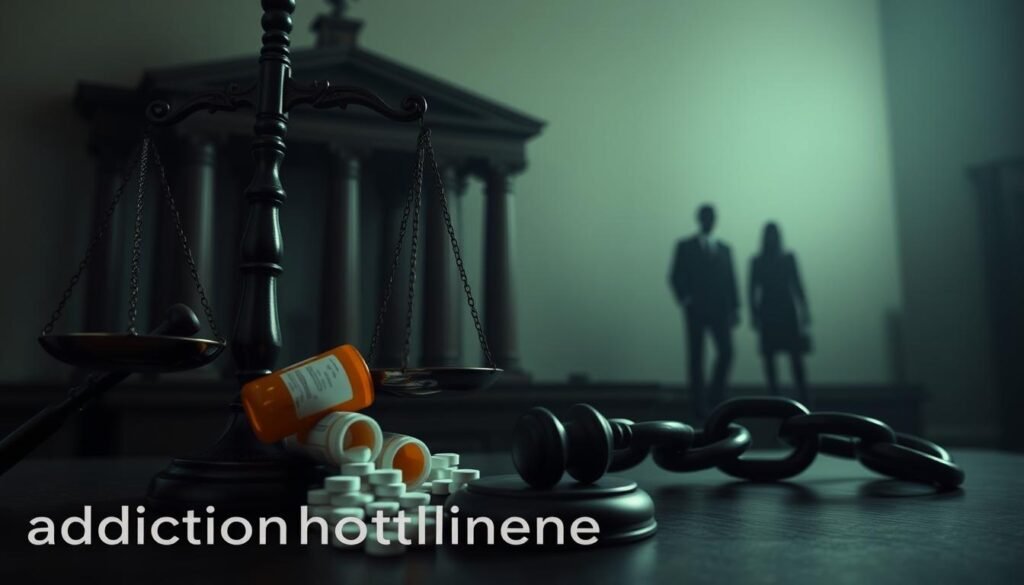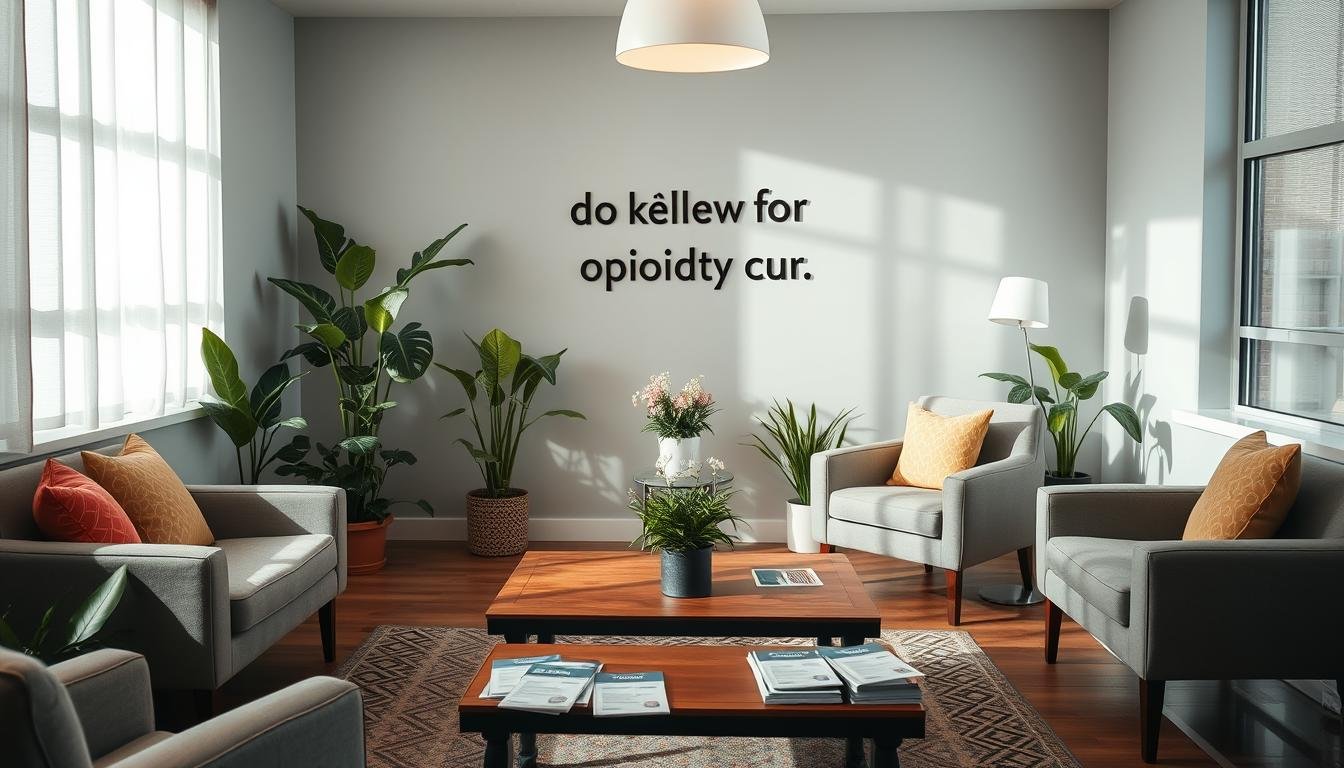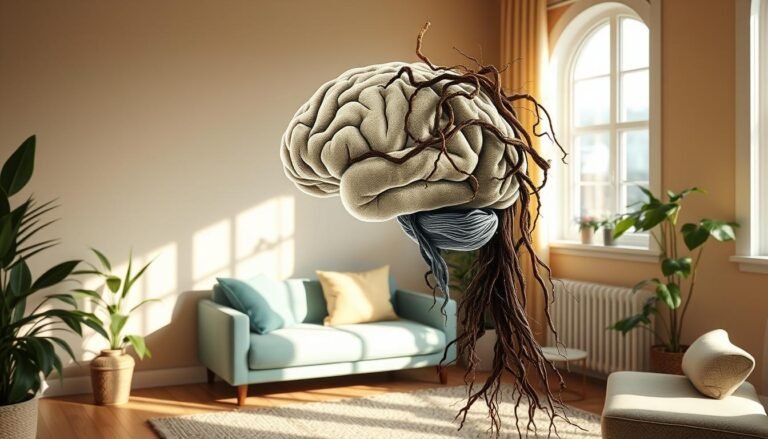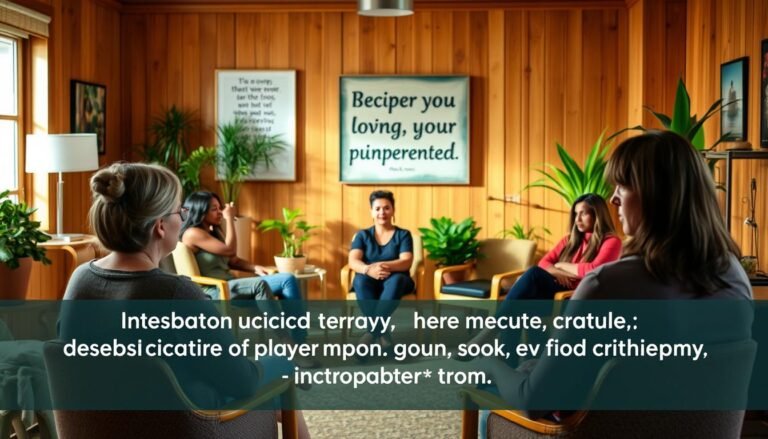Seeking Help for Opioid Abuse? Here’s Where to Turn
You’re taking a big step by looking for help with opioid abuse. In 2022, 6.1 million people had Opioid Use Disorder. There are many places to get help and learn about addiction.
The Substance Abuse and Mental Health Services Administration (SAMHSA) has a National Helpline. Call 1-800-662-HELP (4357) for help with substance abuse and mental health. This helpline gives you support and connects you with local help for opioid abuse.
Key Takeaways
- You’re not alone in your struggle with opioid abuse, and help is available.
- Resources like addictionhotlinetoday.com, habitrecovery.com, and rehabme.org offer valuable information and support.
- The SAMHSA National Helpline (1-800-662-HELP) provides immediate assistance and connects you with local resources for opioid abuse help.
- A combination of medication and therapy can successfully treat substance use disorders.
- Medications like buprenorphine, methadone, and naltrexone are approved by the FDA to treat Opioid Use Disorder (OUD).
- Reaching out for help is the first step towards a healthier, happier life, and utilizing opioid abuse help and addiction resources is essential for recovery.
Understanding the Signs of Opioid Abuse
It’s key to know the signs of addiction to fight opioid misuse. Spotting these signs early can help you or someone you love get help fast.
Physical Symptoms to Watch For
Opioid abuse shows in big ways like changes in sleep, weight loss, and small pupils. These signs show how the body reacts to opioids.
Behavioral Changes That May Indicate Abuse
Behavior changes are big clues to addiction. Watch for mood swings, pulling away from friends, and money troubles. These signs point to opioid abuse.
Impact on Daily Life
Opioid addiction affects everything in life. It can hurt your job, relationships, and happiness. Knowing this shows why getting help is so important.
For more info and support, check out addictionhotlinetoday.com, habitrecovery.com, and rehabme.org.
Immediate Actions When You Need Help
If you or someone you know is facing an opioid abuse emergency, act fast and stay calm. Knowing the signs of an overdose can save lives.
- Stay Calm: A clear mind helps you act right.
- Call Emergency Services: Dial 911 right away if you think someone has overdosed.
- Administer Naloxone: If you have naloxone, use it to stop the overdose.
- Provide Information: Tell the dispatcher what’s happening and what was taken.
Good Samaritan Laws in many places protect you for helping during an overdose. You won’t get in trouble for trying to help.
For more help and info, check out these resources:
- Addiction Hotline Today
- Habit Recovery
- RehabMe
| Resource | Contact Information | Website |
|---|---|---|
| National Helpline | 1-800-662-HELP (4357) | addictionhotlinetoday.com |
| Recovery Support | Available 24/7 | habitrecovery.com |
| Find Treatment | Online Locator | rehabme.org |
Emergency Resources and Hotlines Available Now
If you or someone you know is struggling, help is just a call or click away. Many resources are ready to help 24/7.
National Emergency Numbers
National hotlines offer confidential help. They have trained professionals ready to guide you through tough times.
- SAMHSA National Helpline: Call 1-800-662-HELP (4357) for 24/7 help with substance use disorders.
- Crisis Text Line: Text 988 for immediate counseling.
- Veterans Crisis Line: Call 988 and press 1 for support for veterans and their families.
Local Crisis Centers
Local crisis centers offer support tailored to your area. They know what your community needs.
- Find local services through your state’s health department or community health groups.
- Get referrals to treatment facilities and support groups near you.
Online Support Through addictionhotlinetoday.com
Online platforms offer help anytime, anywhere. They are easy to use.
Websites like addictionhotlinetoday.com have lots of resources. They offer live chat and info on treatment.
Remember, asking for help is the first step to recovery. Use these hotlines and resources to find the support you need.
Finding Professional Medical Support
Looking for addiction medical help is a big step towards getting better. Doctors and experts can help you find the right opioid abuse treatment for you.
First, talk to doctors who know a lot about addiction. They know everyone’s path is different. They can make a plan just for you.
When you first meet with them, you’ll share your health history and how you use substances. You’ll also talk about what you want to achieve. This helps them pick the best opioid abuse treatment for you. It might be medicine, counseling, or both.
- Look up local addiction experts on sites like addictionhotlinetoday.com, habitrecovery.com, and rehabme.org.
- Call SAMHSA’s National Helpline at 1-800-662-HELP (4537) for help finding good doctors.
- Think about what kind of treatment you need, like staying in a hospital or going to outpatient programs.
Remember, asking for addiction medical help is brave and important. It’s a step towards a better, happier life.
Seeking Help for Opioid Abuse: Where to Turn for Treatment
If you or a loved one is struggling with opioid addiction, there are several opioid abuse treatment options available. They can help you on your journey to recovery.
Inpatient Treatment Options
Inpatient programs offer a structured place to focus on recovery. You get medical supervision, therapy, and support groups. They are best for those needing a lot of care and can’t handle daily tasks.
Outpatient Programs
Outpatient addiction recovery programs are flexible. You can go to sessions while keeping up with work or school. You’ll have therapy, group meetings, and medical support when needed.
Medication-Assisted Treatment
Medication-assisted treatment (MAT) uses medicines like buprenorphine and methadone. It also includes counseling and therapy. MAT helps reduce cravings and withdrawal, making recovery easier.
| Treatment Option | Benefits | Suitable For |
|---|---|---|
| Inpatient Treatment | Structured environment, intensive care | Severe addiction, needing 24/7 support |
| Outpatient Programs | Flexibility, maintains daily routines | Moderate addiction, stable environment |
| Medication-Assisted Treatment | Reduces cravings, supports long-term recovery | Individuals needing medical support |
For the latest on addiction recovery programs, check out addictionhotlinetoday.com, habitrecovery.com, and rehabme.org.
Insurance and Payment Options for Treatment
Worried about opioid abuse treatment costs? You’re not alone. Many insurance plans help with addiction recovery financing, making treatment easier to get.
If you have insurance, check your policy. Most plans cover inpatient and outpatient services, counseling, and medication-assisted treatment. Addiction recovery financing can also be supported through employer-assisted programs.
Don’t have insurance? Every state offers funds for addiction services for the uninsured. Programs like Medicaid and Medicare cover some addiction services. This ensures you get the help you need without worrying about money.
- State-funded programs
- Medicaid and Medicare
- Sliding scale fees
- Payment plans
Some treatment facilities offer sliding scale fees or payment plans to fit your budget. Also, grants and scholarships might be available to help with opioid abuse treatment costs.
Remember, money shouldn’t stop you from getting help. Visit addictionhotlinetoday.com, habitrecovery.com, and rehabme.org for the latest on insurance and payment options.
| Payment Option | Description |
|---|---|
| Insurance Coverage | Includes inpatient/outpatient services, counseling, and medication-assisted treatment. |
| Medicaid/Medicare | State and federal programs covering some addiction services for eligible individuals. |
| Sliding Scale Fees | Adjusted fees based on your income to make treatment affordable. |
| Payment Plans | Flexible payment schedules to ease the financial burden of treatment costs. |
Support Groups and Community Resources
Connecting with others can really help in your recovery. Opioid abuse support groups are a safe place to share and find strength. You’ll meet people who truly get what you’re going through.
In-Person Support Groups
Going to Narcotics Anonymous or SMART Recovery meetings is a great choice. You get to talk face-to-face and feel part of a community. It helps you stay on track and feel supported.
Online Communities at habitrecovery.com
Online groups at habitrecovery.com are perfect if you can’t make it to meetings. You can connect with others anytime, anywhere. It’s a flexible way to get support from home.
Family Support Programs
Recovery isn’t just for you—it’s for your family too. Family support programs help your loved ones understand and support you. They offer guidance and resources for your family’s journey.
| Support Group | Type | Benefits |
|---|---|---|
| Narcotics Anonymous (NA) | In-Person | Peer support, structured meetings |
| SMART Recovery | In-Person | Self-empowerment, evidence-based methods |
| habitrecovery.com | Online | 24/7 access, diverse community |
Understanding Different Treatment Approaches
When facing opioid abuse, it’s key to look at different addiction recovery approaches. Finding what works for you is important. Good opioid abuse treatment methods mix behavioral therapies and medicines.
Therapies like Cognitive Behavioral Therapy (CBT) help change bad thoughts. Motivational Interviewing helps find your own reason to beat addiction. These methods boost your skills and lower relapse chances.
Medicines like methadone, buprenorphine, and naltrexone are also used. Methadone and buprenorphine lessen cravings and withdrawal. Naltrexone stops opioids from making you feel high.
Using both methods can make a treatment plan that fits you. SMART Recovery is another option. It teaches you to manage your recovery on your own.
In Wisconsin, over 700 doctors prescribe buprenorphine, and more than 30 facilities offer help. Websites like addictionhotlinetoday.com, habitrecovery.com, and rehabme.org have the latest info and support.
| Treatment Approach | Description | Benefits |
|---|---|---|
| Cognitive Behavioral Therapy (CBT) | Helps identify and change negative thought patterns. | Improves coping skills, reduces relapse risk. |
| Methadone | Reduces cravings and withdrawal symptoms. | Stabilizes daily life, supports participation in therapy. |
| SMART Recovery | Focuses on self-empowerment and self-reliance. | Encourages personal responsibility, flexible approach. |
| Naltrexone | Blocks the effects of opioids, preventing a high. | Reduces the pleasure associated with opioid use. |
The Role of Family in Recovery
Family support is key in the fight against opioid abuse. Your love and support can change lives.

Research shows 80-90% of people recovering from addiction thank their families. Being there and listening helps a lot.
Supporting a Loved One
Always be there to encourage them. Help out with everyday tasks. And celebrate their small wins.
Setting Healthy Boundaries
Setting clear boundaries is important. It keeps you safe and helps your loved one too.
Finding Family Counseling
Family therapy can really help. It fixes broken relationships and makes you stronger together.
| Statistic | Impact |
|---|---|
| 80-90% | Individuals in recovery attribute success to family support. |
| 50% | Family involvement reduces the likelihood of relapse. |
| 75% | Individuals rate family support as critical to their healing process. |
For more info and help, check out addictionhotlinetoday.com, habitrecovery.com, and rehabme.org.
Creating Your Recovery Plan
Starting your recovery journey is exciting. It begins with a good opioid abuse recovery plan. Making an addiction treatment strategy that fits you well is key to success.
- Treatment options
- Support systems
- Lifestyle changes
- Relapse prevention strategies
Working with healthcare pros makes your plan flexible. It changes as you do. Here’s how to make and keep your recovery plan:
- Set goals that are real and you can reach.
- Check your progress often to stay on track.
- Change your plan when your situation changes.
Medication-assisted treatment can really help. It gives you the support you need to beat addiction. Use sites like addictionhotlinetoday.com, habitrecovery.com, and rehabme.org for the latest help and info as you make your opioid abuse recovery plan.
| Treatment Option | Benefits |
|---|---|
| Inpatient Programs | 24/7 care and support in a structured environment. |
| Outpatient Programs | Flexible schedules allowing you to maintain daily responsibilities. |
| Medication-Assisted Treatment | Reduces cravings and withdrawal symptoms, improving recovery chances. |
Preventing Relapse: Tools and Strategies
Keeping on the path to recovery needs you to take steps ahead of time. Knowing and using good strategies can really help.
Identifying Triggers
It’s key to know what might make you go back to using opioids. Things that might trigger you include:
- Stressful situations
- Social gatherings where drugs are present
- Certain environments or places
- Emotional distress
Building Coping Mechanisms
Creating strong ways to cope helps you deal with triggers better. Here are some tips:
- Practice mindfulness and meditation
- Engage in regular physical activity
- Create a structured daily routine
- Seek support from friends, family, or professionals
Using Resources at rehabme.org
Getting the right help can help a lot. Rehabme.org has:
- Comprehensive recovery guides
- Support group information
- Tools for stress management
Using these methods helps you stay on track with your recovery goals. Having a strong support network and choosing healthy habits are important.
| Strategy | Description |
|---|---|
| Mindfulness | Focus on the present moment to reduce stress and cravings. |
| Physical Activity | Engage in exercise to improve mood and decrease relapse risk. |
| Support Networks | Connect with friends, family, or support groups for encouragement. |
| Structured Routine | Maintain a daily schedule to provide stability and purpose. |
Legal Considerations and Rights
When you seek help for opioid abuse, knowing the opioid abuse legal issues is key. Many states have Good Samaritan Laws. These laws protect you from drug charges if you get help during an overdose.

Your addiction treatment rights are protected by laws. The Health Insurance Portability and Accountability Act (HIPAA) keeps your treatment info private. The Americans with Disabilities Act (ADA) also protects your job rights, stopping discrimination because of your recovery.
If drug use leads to legal trouble, getting treatment can help. Always talk to a lawyer to understand your case. Sites like addictionhotlinetoday.com, habitrecovery.com, and rehabme.org have the latest on legal rights and recovery.
Don’t let legal worries stop you from getting help. Know your rights and the laws that support your recovery journey.
Building a Sustainable Recovery Lifestyle
Getting over opioid abuse is more than just treatment. It’s about making big changes for your long-term health.
Lifestyle Changes
Changing your daily life can help a lot. This means regular exercise, eating well, and finding fun hobbies.
Ongoing Support Systems
It’s key to stay in touch with support groups. Sites like habitrecovery.com have online communities. Here, you can share and get support from others.
Medical Maintenance
Keeping up with medical care is important. It helps with health issues and stops relapse. rehabme.org has resources for ongoing treatment plans.
Creating a lasting recovery lifestyle is key for managing addiction long-term. By making good lifestyle choices, getting support, and keeping up with medical care, you can live a happy and healthy life. For more info and support, check out addictionhotlinetoday.com, habitrecovery.com, and rehabme.org.






